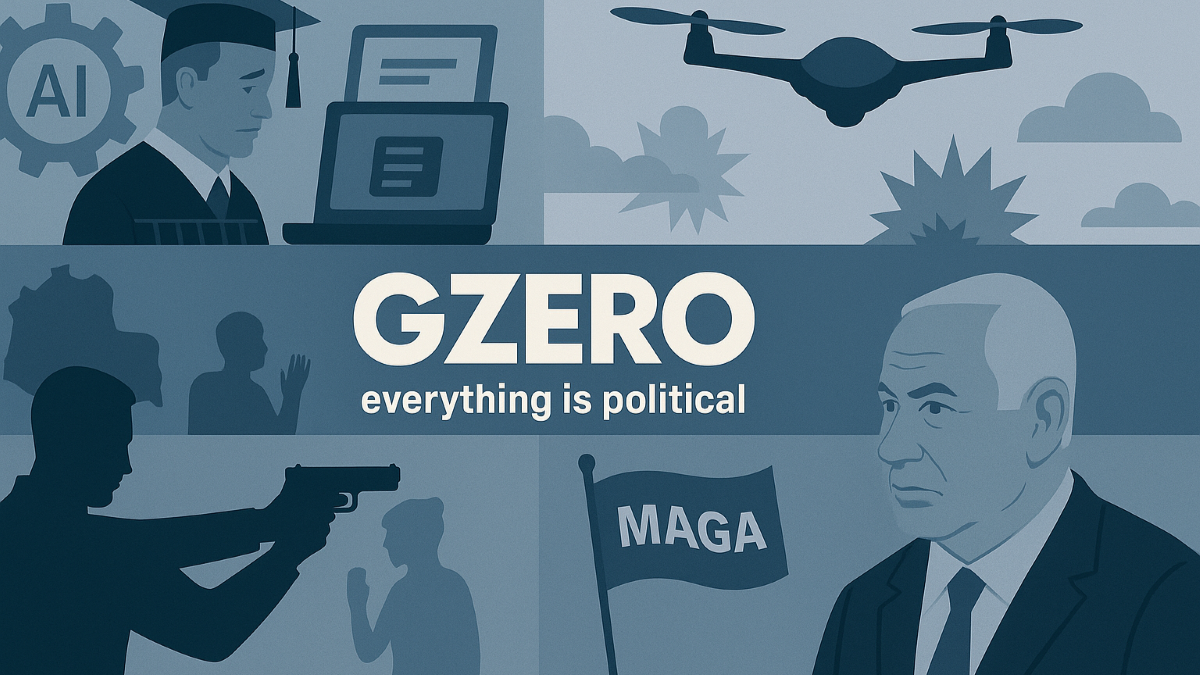August 29, 2025
As summer winds down this weekend, here are the geopolitical stories you may have missed while your inbox was on “out of office” — the ones we expect will have the biggest impact this fall.
In Sudan, the skies have turned deadly
Drones have become the new face of modern warfare, dominating headlines as Russia and Ukraine trade near-daily aerial strikes. But unmanned aircraft vehicles (UAVs) are wreaking havoc in another of the world’s deadliest, and least covered, conflicts: Sudan.
With drones now entering the fray, the conflict risks escalating into a dangerous new phase, allowing both sides to keep inflicting damage with minimal risks to themselves.
Ever since the SAF recaptured the capital Khartoum in March, the two sides have been locked in a strategic stalemate, with drones enabling both groups to carry out precision strikes hundreds of miles behind enemy lines.
Is Sudan a sign of future of warfare? Read more here.
A surge of political violence has revived Colombia’s worst fears
When a gunman shot Colombian presidential candidate Miguel Uribe in June,it sparked memories of the deadly decades-long internal conflict from late last century when political assassination attempts were a common occurrence.
Fast forward nearly three months, Uribe is now dead, and the violence between dissidents and the military has intensified – there have been multiple reports of mass kidnappings of government soldiers. Left-wing President Gustavo Petro has pledged to clamp down on the violence, but he can’t seem to put a lid on things: the number of kidnappings and killings of human rights activists have soared over the last few years.
This will likely cost the left, politically speaking. The rising violence is prompting more and more Colombians to seek a tough-on-crime leader, damaging Petro’s hopes that a socialist candidate will win next year’s presidential election – the incumbent leader can’t run again.
The shift in Colombia’s politics is also something of a proxy for the rest of South America. Other countries with left-wing leaders, like Bolivia and Chile, have also tilted right, seeking leaders who will keep them safe. Bolivians ousted the socialists from power for the first time in decades. Chile’s elections in November will be the next test for the South American left, before Colombia’s election next May.
Will the rising violence hurt the Colombian left? Read more here.
Is MAGA bailing on Bibi?
In early July, there were some rumblings of discontent within the Trump administration at Israeli Prime Minister Benjamin Netanyahu. An Israeli shell had struck a church in Gaza, settlers had attacked a Christian Palestinian village, and the Israeli Defense Forces had bombed the Syrian Defense Ministry in Damascus – against the White House’s wishes.
But the disquiet was only the tip of the iceberg: Trump supporters, especially younger ones, are becoming more and more critical of Israel, questioning the US’s support for the Jewish State. Though younger Republicans aren’t nearly as critical as younger Democrats, this trend is a concerning one for Israel, as the country has relied heavily on US military aid. Republicans have been particularly sympathetic toward Israel in recent history, so to lose their backing would be drastic.
Soon after the piece was published, US Rep. Marjorie Taylor Greene – a MAGA firebrand – became the first House Republican to label Israel’s actions in Gaza as a “genocide,” affirming that the GOP is no longer united behind supporting Israel. Read the original GZERO report here.
Is AI why college grads can’t find jobs?
The kids are not alright. Since we opened the Pandora’s Box of chatbots, new grads have faced higher unemployment than the national average for the first time in decades. Which raises the question: are they the canaries in the coal mine that AI-driven job disruption has begun?
“It just seems like there’s not any more entry-level roles,” reports James Kettle, a 25-year-old Columbia University graduate who’s been on the job hunt since May. His experience is echoed in a new Stanford study, which found hiring in AI-exposed occupations for early-career workers is down 13%.
Even if we can’t be certain AI is totally to blame for stealing young people’s existing jobs (yet), it’s making it harder for them to get hired in the first place. Delia Thompson, a 23-year-old University of Virginia graduate who’s been on the hunt for seven months,describes the job process today as “shouting into the void,” as she and other candidates send thousands of AI-assisted resumes through LinkedIn, only for companies to use their own algorithms to sift through the pile – a loop of bots talking to bots. “It makes it feel like a total lottery,” says Thompson.
This is reshaping their political views and how many young people are viewing AI overall. Read more here.
More For You
A photograph posted by U.S. President Donald Trump on his Truth Social account shows him sitting next to CIA Director John Ratcliffe as they watch the U.S. military operation in Venezuela from Trump's Mar a Lago resort, in Palm Beach, Florida, U.S., January 3, 2026.
@realDonaldTrump/Handout via REUTERS
Most Popular
- YouTube
In this "ask ian," Ian Bremmer analyzes Trump’s recent meeting with Zelensky and how close (or far) Russia and Ukraine are from a peace deal.
Syrian President Ahmed al-Sharaa attends the military parade of the Syrian army in Umayyad Square in central Damascus to mark the one-year anniversary of the fall of the Assad regime, on Dec. 8, 2025.
Mohammed Al-Rifai/dpa via Reuters Connect
A year ago this month, Syria’s brutal dictatorship collapsed. There are signs of recovery, but sectarian violence threatens to undermine the optimism.
© 2025 GZERO Media. All Rights Reserved | A Eurasia Group media company.
